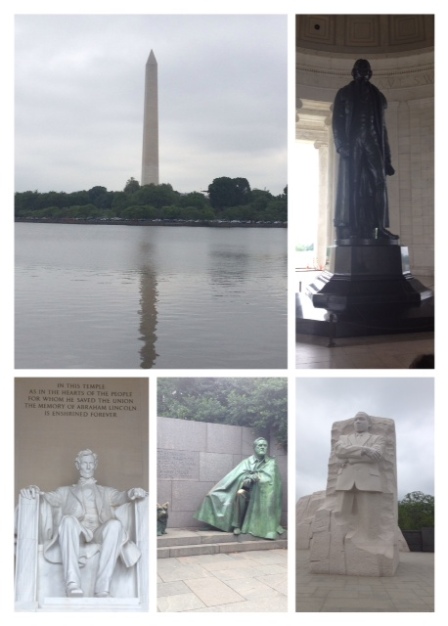How exciting is it to share my travel experience to the nation’s capital when discussing colonialism. In today’s society, colonialism is not synonymous with the practice of taking control over a territory or people, rather it is now representative of a “state of mind” where one might believe that their nation or culture is better than the “other.” This is prevalent in political discourse where pundits try to advance the agenda of their chosen platforms by focusing on the differences between their point of view and that of the “other” by representing the “other” as inferior. Deeply rooted in pride and the premise of superiority, Colonialists may feel a sense of duty to save the “other” (which he considers to be subordinate to himself) by introducing him to his ways.
In a humorous TED Talk, Sheena Iyengar gives an example of this in “The Art of Choosing.” Her example of trying to order green tea with sugar in Japan was humorous yet telling. Iyengar, who was adamant about ordering green tea with sugar, was told by a Japanese waiter that they don’t serve green tea with sugar. When she and the waiter couldn’t come to an understanding, his manager intervened and told her that they don’t have any sugar so she ordered coffee which came with two packets of sugar. Although this scenario elicited laughs from the audience, the impasse resulted from the differences among the “other” and his/her beliefs. Each side was trying to force the “other” to adopt his/her way. Iyengar gave a detailed argument regarding the “Art of Choosing.” She indicated that choice is the American way. Her research revealed that certain demographics preferred to have the freedom to choose; whereas, some cultures thrived when given specific directions from authority figures such as their mothers.
When discussing colonialism, it is important to define the “other.” The “other” is anyone different than oneself. The “other” can be different in gender, race, religion, political views or party affiliation. Are our choices as writers influenced by our gender, race, sexuality, economic background? In “Travel Writing and Gender,” Susan Bassnett states that “social commentary transcends gender boundaries and, increasingly in the twentieth century, male and female travelers have written self-reflexive texts that defy easy categorization as autobiography, memoir or travel account” (225). Bassnett also states that early male travel writers marginalized women travellers by referring to them as exceptional and different from other women because they were capable of carrying out feats that normal women could not (228).
Is it possible or easy to change our approach to the “other”? Absolutely, if we consider Bhabba’s theory that “Out of Many One: nowhere has this founding dictum of the political society of the modern nation – its spatial expression of a unitary people – found a more intriguing image of itself than in those diverse languages of literary criticism that seek to portray the great power of the idea of the nation in the disclosures of its everyday life; in the telling details that emerge as metaphors for national life” (142).
On a recent trip to Washington, DC, I visited the national mall where I saw memorials dedicated to great men in history. During this visit, I stopped by the Washington Monument, Jefferson and Lincoln Memorials, the Franklin D. Roosevelt Memorial and the recently created Martin Luther King, Jr. Memorial, which was the subject of controversy. The construction of the Martin Luther King, Jr. Memorial, was widely supported, yet there was controversy surrounding the memorial’s design. The Chinese artist who created the statue paraphrased a quote from Dr. King’s “Drum Major’ speech, which led to a debate among notable African Americans who said that the quote was taken out of context. The debate ultimately led to the removal of the quote which was inscribed on the side of the memorial. One might wonder if the controversy surrounding the context of the quote could have anything to do with the Chinese artist being a member of a culture which is “other” than Dr. King and those who debated the validity of the quote. Regardless of the design concerns, it was awe-inspiring to see all of the memorials on the national mall and think about the impact that all of these great Americans had on the history of our country.
According to Bhabba, “Where the telling of the individual story and the individual experience cannot be ultimately involve the whole laborious telling of the collectivity itself” (140). Babbha also said that once liminality of the nation-space is established, and it’s signifying difference is turned from boundary “outside” to its finitude “within” the threat of cultural difference is no longer a problem of the “other” people (150).


Cynthia,
It was lovely to see how you incorporated the readings into your travels. There must be something to holding any nation’s capital up as a mirror of imperialism – either the country’s own imperialism or as a means of another country’s, especially since capitals have been historically moved around so much – the capital being the capital of the culture that’s either “othering” other cultures, or the result of being “othered” itself.
Cynthia, I cannot thank you enough for pointing out that the definition of imperialism is really more of a state of mind – one in which we believe our own country is better than another. I think I have been very stuck on the traditional definition which has been hindering my understanding of the broader concept. From Iynegar, to Bassnett, to Bhabha, you did a wonderful job of incorporating our readings into your blog post and trip to Washington, D.C. and in particular the building of the MLK Memorial.
Cynthia, in the future I expect a lot more signs to be in Chinese!
I like how you say “colonialism is a state of mind.” Certainly it is, but I wonder what other factors are the most important? I think Spurr’s last article clarified that more for us, or how to avoid imperialistic attitudes in our travel writing. It’s interesting to look back and see the development of each student’s blog in the course. It’s been an intense and amazing journey together.
I’m enjoying your concise synopsis of this module; it reminds me of the concept of “the other’ again, and how this plays out in daily life.
Also, great storytelling (or retelling) on the green tea story. Nice progression.
Rhea